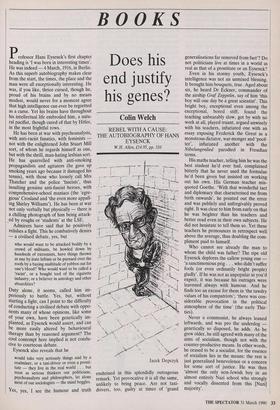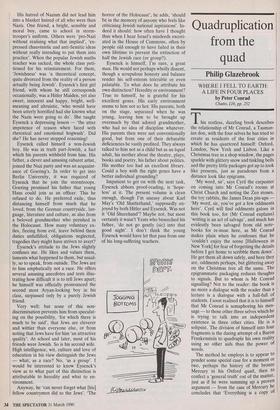BOOKS
Does his end justify his genes?
Colin Welch
REBEL WITH A CAUSE: THE AUTOBIOGRAPHY OF HANS EYSENCK
W.H. Allen, £14.95, pp. 310 rofessor Hans Eysenck's first chapter heading is 'I was born in interesting times'. He was indeed — 4 March, 1916, in Berlin. As this superb autobiography makes clear from the start, the times, the place and the man were all exceptionally interesting. He was, if you like, thrice cursed, though he, proud of his brains and by no means modest, would never for a moment agree that high intelligence can ever be regretted as a curse. Yet his brains have throughout his intellectual life embroiled him, a natu- ral pacifist, though cured of that by Hitler, in the most frightful rows. He has been at war with psychoanalysts, with anti-racist fanatics, with feminists not with the enlightened John Stuart Mill sort, of whom he regards himself as one, but with the shrill, man-hating lesbian sort. He has quarrelled with anti-smoking propagandists and agitators (he gave up smoking years ago because it damaged his tennis), with those who loosely call Mrs Thatcher and the police 'fascists', thus insulting genuine anti-fascist heroes, with comprehensive-school maniacs (the 'egre- gious' Crosland and 'the even more appall- ing Shirley Williams). He has been at war not only verbally but physically — there is a chilling photograph of him being attack- ed by roughs or 'students' at the LSE.
Admirers have said that he positively relishes a fight. This he combatively denies — a civilised debate, yes, but
who would want to be attacked bodily by a crowd of militants, be howled down by hundreds of extremists, have things thrown at one by irate leftists or be pursued over the roofs by a baying multitude of yobbos out for one's blood? Who would want to be called a `racist', or a bought tool of the cigarette industry, or a believer in astrology and other absurdities?
Duty alone, it seems, called him im- periously to battle. Yes, but, without starting a fight, can I point to the difficulty of conducting a civilised debate with oppo- nents many of whose opinions, like some of your own, have been genetically im- planted, as Eysenck would assert, and can be more easily altered by behavioural therapy than by reasoned argument? The cool contempt here implied is not condu- cive to courteous debate.
Eysenck also reveals that he
would take very seriously things said by a coalminer, or a taxi-driver or even a prosti- tute — they live in the real world . . . but treat as serious thinkers our politicians, psychoanalysts and philosophers, let alone most of our sociologists — the mind boggles.
Yes, yes, I see the humour and truth Jacek Depczyk enshrined in this splendidly outrageous remark. Yet provocative it is all the same, unlikely to bring peace. Are not taxi- drivers, too, guilty at times of 'grand generalisations far removed from fact'? Do not politicians live at times in a world as real as that of a prostitute or an Eysenck?
Even in his stormy youth, Eysenck's intelligence was not an unmixed blessing. It brought him bouquets, true. Aged about six, he heard Dr Eckner, commander of the airship Graf Zeppelin, say of him 'this boy will one day be a great scientist'. This bright boy, exceptional even among the exceptional, bored stiff, found the teaching unbearably slow, got by with no work at all, played truant, argued unwisely with his teachers, infuriated one with an essay exposing Frederick the Great as a monstrous dictator, war-monger and `poof- ter' , infuriated another with the Nibelungenlied parodied in Freudian terms.
His maths teacher, telling him he was the best student he'd ever had, complained bitterly that he never used the formulae he'd been given but insisted on working out his own. His German teacher mis- quoted Goethe. 'With that wonderful tact and diplomacy that characterised me from birth onwards', he pointed out the error and was publicly and unforgivably proved right. It was clear to him from early on that he was brighter than his teachers and better read even in their own subjects. He did not hesistate to tell them so. Yet these teachers he pronounces in retrospect well above the average, thus doubling the com- pliment paid to himself.
Who cannot see already the man to whom the child was father? The ripe old Eysenck deplores the callow young one 'a sanctimonious prig . . . who didn't suffer fools (or even ordinarily bright people) gladly'. If he was not as unpopular as you'd expect, it was because his outrages were leavened always with humour. And he finds too an excuse for them in 'the tawdry values of his compatriots'; 'there was con- siderable provocation in the political atmosphere of the time' (the early Thir- ties).
Never a communist, he always leaned leftwards, and was pro the underdog genetically so disposed, he adds. As he grew older, he still agreed with many of the aims of socialism, though not with the counter-productive means. In other words, he ceased to be a socialist, for the essence of socialism lies in the means: the rest is just generalised benevolence or a concern for some sort of justice. He was then `almost the only non-Jewish boy in an almost entirely Nazi school who strongly and vocally dissented from this [Nazi] majority'. His hatred of Nazism did not lead him into a blanket hatred of all who were then Nazis. One friend, a bright, sensible and moral boy, came to school in storm- trooper's uniform. Others were 'pro-Nazi without realising what that implied', 'ex- pressed chauvinistic and anti-Semitic ideas without really intending to put them into practice'. When the popular Jewish maths teacher was sacked, the whole class peti- tioned for his reinstatement. For them, lewishness' was 'a theoretical concept, quite divorced from the reality of a person actually being Jewish'. Eysenck's first girl friend, with whom he still corresponds occasionally, was a Hitler Maiden, yet also sweet, innocent and happy, bright, well- meaning and altruistic, 'who would have been utterly horrified had she known what the Nazis were going to do'. She taught Eysenck a depressing lesson — 'the utter impotence of reason when faced with rhetorical and emotional hogwash'. Did she? He has never stopped reasoning!
Eysenck called himself a non-Jewish boy. He was in truth part-Jewish, a fact which his parents withheld from him. His father, a clever and amusing cabaret artist, joined the Nazi party and was an acquaint- ance of Goering's. In order to get into Berlin University, it was required of Eysenck that he join the stormtroops. Goering promised his father that young Hans could join as an officer. This he refused to do. He preferred exile, thus distancing himself from much that he loved, from the German countryside, lan- guage, literature and culture, as also from a beloved grandmother who perished in the Holocaust. How many voluntary ex- iles, fleeing from evil, leave behind them duties unfulfilled, obligations neglected, tragedies they might have striven to avert?
Eysenck's attitude to the Jews slightly confuses me. He likes and values them, laments what happened to them, but usual- ly, so to speak, from outside. The Jews are to him emphatically not a race. He offers several amusing anecdotes and tests illus- trating how difficult it is to tell Jews apart; he himself was officially pronounced the second most Aryan-looking boy in his class, surpassed only by a purely Jewish friend.
Very well: but none of this non- discrimination prevents him from speculat- ing on the possibility, 'for which there is much to be said', that Jews are cleverer and wittier than everyone else, or from noting that Jews have for him 'an attractive quality'. At school and later, most of his friends were Jewish. So is his second wife. High intelligence, wit, culture and love of education in his view distinguish the Jews — what, as a race? No, 'as a group'. I would be interested to know Eysenck's view as to what part of this distinction is attributable to heredity and what to en- vironment.
Anyway, he 'can never forget what [his] fellow countrymen did to the Jews'. 'The horror of the Holocaust', he adds, 'should be in the memory of anyone who feels like criticising Jewish national aspirations'. In- deed it should: how often have I thought thus when I hear Israel's misdeeds excori- ated in the House of Commons, often by people old enough to have failed in their own lifetime to prevent the extinction of half the Jewish race (or group?).
Eysenck is himself, I'm sure, a great man. He would not perhaps wholly dissent, though a scrupulous honesty and balance render his self-esteem tolerable or even palatable. To what does he attribute his own distinction? Heredity or environment? True to himself, he is grateful for his excellent genes. His early environment seems to him not so hot. His parents, both on the stage, separated when he was young, leaving him to be brought up overmuch by that adored grandmother, who had no idea of discipline whatever. His parents then were not conventionally good, but from one of their debatable deficiencies he vastly profited. They always talked to him not as a child but as an equal adult, his mother about the theatre, plays, books and poetry, his father about politics. His mother too had an excellent library. Could a boy with the right genes have a better individual grounding?
Impatient to get on with the next task, Eysenck abhors proof-reading, is 'hope- less' at it. The present volume is clean enough, though I'm uneasy about Karl May's 'Old Shatterhand,' supposedly en- joyed by both Hitler and Eysenck. Was not it 'Old Shurehand'? Maybe not, but most certainly it wasn't Yeats who beseeched his father, `do not go gently (sic) into that good night'. I don't think the young Eysenck would have let that pass from one of his long-suffering teachers.



























































 Previous page
Previous page